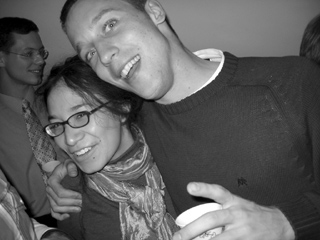Happy Birthday Sasha W
One of the most interesting statements made at the climate change conference was Henry Shue’s moral categorization for inaction on climate change: he called it ‘the infliction of harm upon the defenceless.’ This, he said, is true independently from whether abrupt and harmful climate change scenarios arise. Given what we know, it is akin to forcing someone to play Russian Roulette: even if there is no bullet in the chamber, when the hammer falls, the imposition of the risk is immoral.
The idea of future generations being in a position of helplessness, relative to us, had not occurred to me before. Historical progress has generally involved increases in human capability. I suppose it is only now that we have the widescale ability to threaten vital biological systems that we stand to undermine whatever new capabilities our forebears will have, both technical and economic, by presenting problems insoluble even with future technology.
Scenarios like the disruption of the Thermohaline circulation circulation of the liberation of methane hydrate from the ocean floors definitely seem insoluble, even given vastly increased capability. Perhaps such arguments can help to generate the impetus in the minds of people and policymakers that will be required to move forward with GHG controls.


I’m nearly at the end of John Brunner’s ‘The sheep look up’, which is proccupied with extreme environmental damage (copyright 1972). I find it curious that you had not come across the idea of, “future generations being in a position of helplessness, relative to us,” as this has been a fundamental message of the environmental lobby for decades (part of the “holding the earth in trust for our children” line) and it wasn’t just about giving them a problem but leaving things too messed up to fix, even with superior resources.
In John Brunner’s book, business and government try to carry on as usual in the face of accumulated environmental damage, even at a point where irremediable harm is blatant. The ‘Prexy’ comments in the book echo GW’s tone eerily in my head.
Bryony looks like Cate blanchett
“Were we not to take bold action, the worst impacts of the climate crisis would unfold over many generations, escalating in their destructive power decade by decade. But we cannot wait for the full fury of the crisis in order to mobilize a response, because by then it would already be too late to stop the process that we have set in motion.
By that point, the generation that finally realized that humans have been condemned to an endless degradation of their prospects for the entirety of the lives of their children and their children’s children would be entirely justified in looking backwards at us in our time as a criminal generation that they would curse endlessly as the architects of humanity’s destruction.”
Gore, Al. Our Choice: A Plan to Solve the Climate Crisis. (p. 27 paperback)